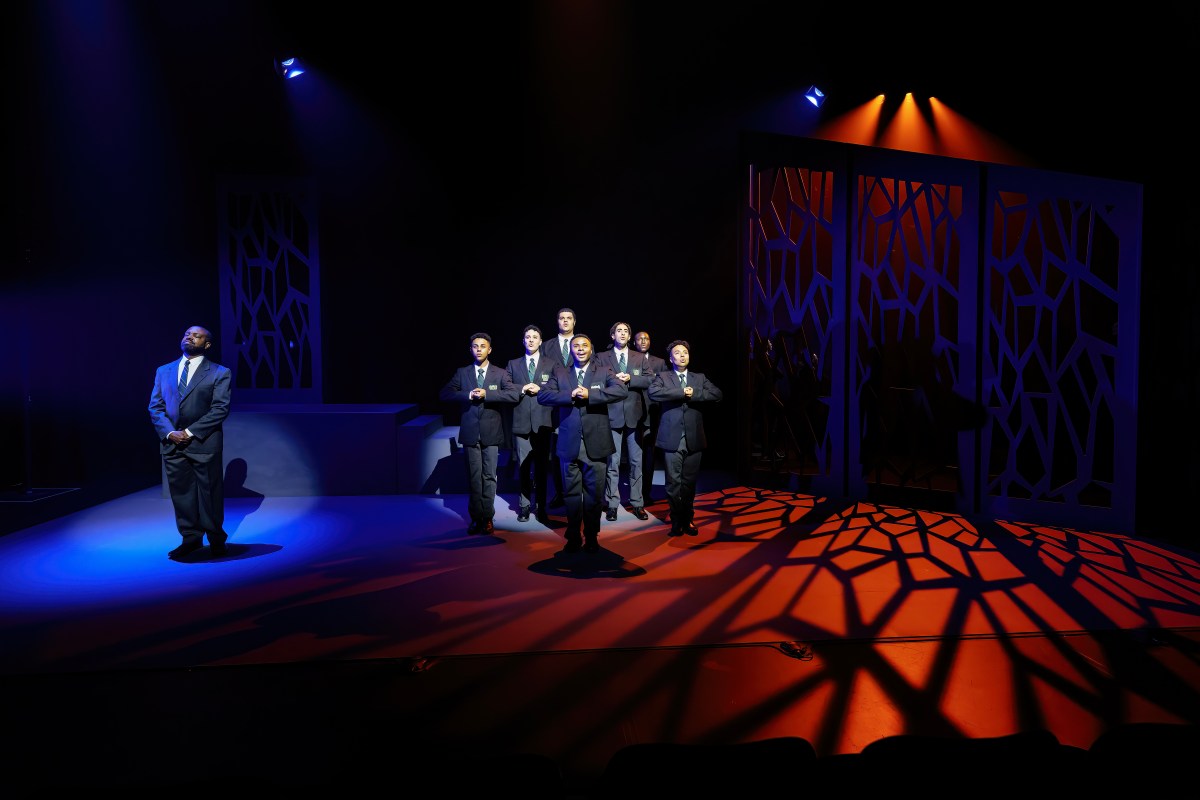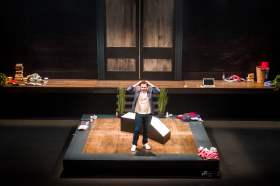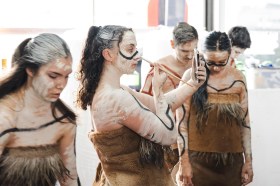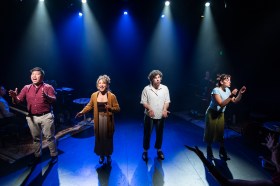From a Tony Award® nominated play to a sizzling circus-burlesque, a new season of works at Riverside Theatres Parramatta celebrates the richness and diversity of the queer experience.
Presented as part of Sydney WorldPride, Riverside’s LGBTIQA+ showcase includes Hafla, a salon celebrating queer and Middle Eastern culture, and the Australian premiere of Choir Boy, a coming-of-age play by Tarell Alvin McCraney, the Academy Award® winning writer of Moonlight.
Theatre-maker Dino Dimitriadis, who is co-directing Choir Boy with Zindzi Okenyo, describes the work as ‘a play with songs – beautiful acapella songs, acapella gospel’.
The protagonist of Choir Boy, Pharus Young, is determined to become the best choir leader in the 50-year history of Charles R Drew Prep School for Boys. But in a world founded on dusty rituals, how can Pharus shine while trying to conform to masculine expectations – not to mention gaining the respect of the choristers he leads?
‘I think what’s really great about this story is that while there are challenges with homophobia, this character is living their truth. It is less a coming out story and more about exploring the consequences that can exist when you’re living your truth, which was something that really drew me to this project,’ Dimitriadis says.
Avoiding the familiar tropes of coming out narratives is one of the few directives curator Maeve Marsden gives to participants in her long-running Queerstories showcase, which is also featured in Riverside’s Sydney WorldPride season.
‘Historically, our community’s stories have been on the margins, and so having a space where those stories are front and centre is so important,’ Marsden says of the popular storytelling night, which was first held in 2015 and has since spawned both a book and an award-winning podcast series.
‘My prompt for the storytellers is to tell the story you want to tell but are never asked to. And I have a little rule, which is please don’t tell your coming out story unless you were jumping out of a plane when it happened. Like, something spectacular has to have happened. Please don’t just say “I knew I was gay when X”, because we’ve heard a lot of those stories,’ she says.
Marsden (whose debut play Blessed Union is currently showing at Belvoir as part of Sydney WorldPride) has run several Queerstories events at Riverside to date, and says the event is always warmly received.
‘Western Sydney has an incredible queer culture. Historically I’ve always programmed Western Sydney locals for these events, but the Sydney WorldPride edition is a bit different. I’ve programmed more celebrities for this one; it’s a bit of a gala,’ she tells ArtsHub.
The storytellers at Riversides Queerstories x WorldPride include self-described tomboy pop artist Handsome, rugby player turned actor Ian Roberts, drag queen Jojo Zaho, Dr Amy Thunig, Ellia Green OAM and Walkley Award-winning journalist Patrick Abboud.
Describing her approach to programming the event, Marsden says: ‘I’ve always just focused on making an entertaining night. And so my choices are always: what is going to entertain a queer audience? Can I give them something different, a new type of story, a new type of storyteller a person they may not have seen before?
‘So, while the WorldPride show has guests that people are more likely to have heard in the media, I’m still encouraging them to tell a story they haven’t told before, so that people are still getting what you’d hoped for at Queerstories, which is something unexpected,’ she explains.
Riverside Theatres’ WorldPride program also includes Matador, a vibrant blend of burlesque, dance and circus arts, and The Life Cycle of Blanco, a new work by Vonne Patiag supported through the National Theatre of Parramatta’s True West program and exploring the impact of casual racism on an actor of colour.
Dimitriadis applauds Riverside’s ‘progressive programming choices’, saying of the National Theatre of Parramatta in particular: ‘It has always looked at work that is addressing under-representation and looked rigorously at the kind of stories we are and aren’t telling.’
They continue: ‘Often, people talk about Western Sydney as this conservative and close-minded part of the state, and sure that exists, but there are also incredibly vibrant burgeoning communities here. Certainly, this venue and this area is such an exciting place to be staging Choir Boy because there are audiences here who want this kind of storytelling. And I think it’s really important that we are showing that these kinds of stories don’t only exist in the inner city, you know?’
Choir Boy marks a first for Dimitriadis. ‘This is the first time I’ve ever co-directed and there are a few people I could do it with and Zindzi [Okenyo] is certainly one of those people. We are both queer people and we’re also really committed to rigour and committed to having a care-centred approach to how we work with the artists on the project.’
Full of praise for their predominantly young cast, Dimitriadis says: ‘The cast, first and foremost, are just the most joyous group of people. They are so committed, they so believe in the project, and they are producing soul-stirring work.
‘What’s also exciting is that they all sing in the work and to have that layer beyond the acting performances is gorgeous… Some of them are very early career, so this is like the biggest thing that they’ve done, and it’s a beautiful way for them to launch into the industry. So that’s just thrilling.’
Dimitriadis notes that Choir Boy is an important step in the right direction for queer theatre.
‘I think what we’re seeing now with queer storytelling, finally, is intersectionality. Choir Boy is not just about being gay – it’s also about being black, it’s about being young. For some of the characters it’s about their socio-economic realities and what education means to them. There are a lot of things that intersect in this work. And there are generational questions that the work throws up too, in terms of history and connection to the past and connection to family and differences within generations of family. So, it is a very intersectional work and I think that is, for me personally, where I think queer storytelling needs to go,’ they conclude.





